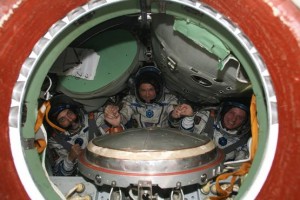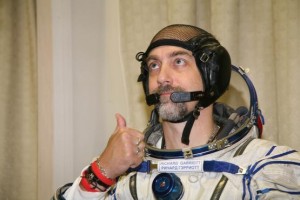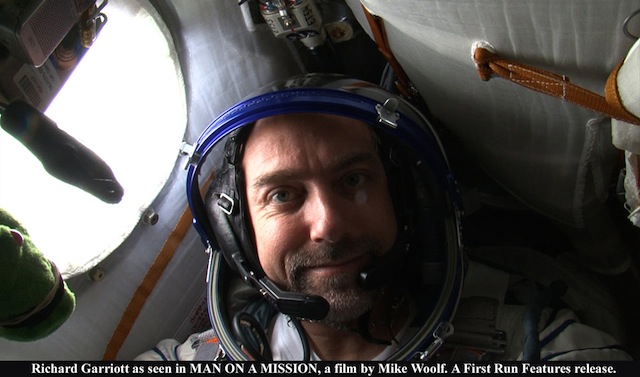GB: You also had the laser eye surgery a long time earlier, too.
Garriott: Yeah, and that turned out to be good fortune. I’m actually the first person who’s ever flown who’s had corrective eye surgery, because it’s been illegal for astronaut candidates. As soon as I was flying, NASA suddenly became very interested in studying my eyes, because I was the first test case of this condition.
GB: It’s really against all the odds there, that it all came through.
Garriott: But you know, what I think is really interesting about it is that, even if it hadn’t come through this last time, I would not have given up on it. I’m very confident, if I hadn’t gone in 2008, I would have gone soon after. Even if I was still pursuing it right now, I would not have given up on this. I’m a big believer that anyone can tackle hugely difficult problems, as long as they have patience and intelligence and stick-to-itiveness. You can tackle pretty amazing things.
GB: What was the earliest period when you dreamed this up? How many years ago, do you think, did you start thinking about space travel?
Garriott: I know exactly when it happened, because I remember the moment very well. When I was very young, of course, my father was an astronaut and all our neighbors were astronauts. So as a kid I didn’t grow up and say, “When I grow up I want to be an astronaut,” because I sort of believed that everybody went. It wasn’t something you had to decide to do. It was just a default assumption, that everybody would go. It was when I was 13 years old, and one of the NASA doctors told me that because I needed glasses I was not eligible to be an astronaut, thereby basically telling me that I was no longer a member of the club that my parents and family and friends were all members of. It was right after that, right after a short bout with disappointment, where I came up with the plan of saying, “Well, if I can’t go with the government space program, I’m going to have to bring into existence a civilian space program.” So maybe about the age of 13.
GB: How soon did you find some of the people who could make it happen?
Garriott: Well, I’d say in 1998, when I met Eric Anderson, which then connected me through to Peter Diamandis and the rest of the founders, the group of us that put together the X-Prize, the ZERO-G Corp. and Space Adventures. That was when it was really busted open.
GB: And it still took quite a long time after that.
Garriott: Well, ’98 to 2008, it’s only 10 years after that. To bring an industry into existence and fly, I don’t think that’s too bad.
 GB: I know Tabula Rasa was going on at the same time there, but I didn’t really remember much mention of it in the movie. Was that by design?
GB: I know Tabula Rasa was going on at the same time there, but I didn’t really remember much mention of it in the movie. Was that by design?
Garriott: Well, in fact there’s an homage to Tabula Rasa, even during my flight itself. During launch, I had my flight data file in my hand, I had a moment where I knew the camera would be facing me, and so I actually displayed a message written in the symbolic language I created, that only the gamers that follow my work could read. So I tried to include gamers with everything from flying the DNA up into space, the secret message, other things. I’ve tried to remain as well-connected to gamers as possible during my flight.
GB: Was it tough doing that balancing act, balancing the game and the space travel at the same time?
Garriott: Well, fortunately in my case the medical pre-qualification that I did throughout the year of 2007 really didn’t require much time. It just meant that once every few months I had to go check in with a doctor, most of that was pretty innocuous. Other than the surgery. That took me offline for about a month. Just because it was a serious surgery, it had recovery time. So fortunately, by the time I went to Russia to even begin my training, Tabula Rasa had already been out for some months. The timing was not accidental. When I first realized that the possibility would be open for me to fly again, I spoke with T.J. Kim, who is the president and founder of NCsoft, and together we picked the year that was safely beyond Tabula Rasa. That way we’d finish Tabula Rasa first and then I could go take the space flight. (Garriott had to go to court to recover a $28 million award from NCsoft after the company let him go).
GB: The relationship with your father was very interesting. Had you guys also planned on him being very involved in all of the mission work?
Garriott: Well, that sort of “evolved,” I’ll call it. Of course, having an expert at that level, having one of the only other people who’s ever left the planet… I think I was number 483 to leave the planet. I suspect… I don’t even know what my dad’s number is, I’ll have to go look it up. But he’s probably somewhere below 100 anyway, maybe 50 or so. Having someone who has had so much experience in a field where almost nobody on earth has had any experience was really a great asset. I wouldn’t say, when I conceived the idea of going, that at that moment I assumed my dad would take such a major role. But it just became obvious over time, as I’m trying to think of experiments to do, commercial activity to do, there’s no better contact than my dad. When I was planning out, scheduling day by day how to sequence things to make sure that I’m at the window to take the right pictures, I’m at the ham radio to make the right communications, fill in the rest with experiments ad hoc… That always changes based on the exact launch date, and also some experiments take too long or you have excess time, so my dad not only helped develop the original schedule, but then really ran the mission control team while I was on orbit as well. It ended up working out fantastically, but I wouldn’t say it was predetermined to be that way.
 GB: (Your father’s presence) made the movie more emotional, it seemed like.
GB: (Your father’s presence) made the movie more emotional, it seemed like.
Garriott: Agreed. What’s funny is that most people who know my dad, and even the way I’ve commonly described my dad, although this description doesn’t really come out in the movie… If you had to say, “Richard, give me a sense of what your father’s personality is like,” I would tell you, unabashedly, with no reservations, and with great precision, “My father is Spock.”
That is literally what I grew up with, a father who was relatively… Not just relatively, utterly non-emotional. With the kids and the family. He was very logical, rational, uses words very carefully. In my home, when we grew up, if somebody said something like, “Do you agree?” you couldn’t say “Right.” Because “right” is a direction. It’s ambiguous as to whether it means “correct” or a direction. We were… It was insisted, in my household, that we use “correct,” not “right,” as an affirmative response. And so I still have very…what I’ll call “scientific” filters on my casual speech, because that’s the circumstances under which I grew up. That actually adds to how meaningful it was for my father and I to do this together. We really had a great time bonding in a way we didn’t get a chance to as father and son in my younger years.
GB: That was the part that made it more interesting. That was good to watch. The Russian side of things was also very interesting too. I guess I can’t think of another documentary like that.
Garriott: Well, no. In fact, the reason why you can’t think of one is because there isn’t one, if you know what I mean. When we were taking cameras around to Russia, we were constantly being told, “This is the first time Western cameras have been into these places.” Brady and Mike were very good about asking for access to things that… The first answer was “No, of course not, that’s never been done, it’s not allowed.” And then we continued to ask and ask and ask until finally people said, “Oh, well, okay, c’mon in.” We really did get footage in this film that has never been seen before. I think that’s one of the reasons why it has particularly special significance.
GB: So was space as much fun as you expected it to be?
Garriott: Of course! But what’s interesting is… It was in very different ways than what I would have guessed. For example, launch you think of as this loud, shaky, scary moment. In fact, on a liquid-fueled rocket like the Soyuz, it’s almost perfectly silent and smooth on the inside. It’s much more cerebral, it feels much more like a ballet move, lifting you ever faster into the sky, than it does a sports car dropping the clutch at a green light. And the same thing’s true for re-entry. Also very smooth, and almost perfectly silent, even as you plunge into the atmosphere and create a plasma hotter than the surface of the sun that’s melting the vehicle around you. Out the window is a pretty surreal visual of the vehicle melting away, it’s only four inches from your shoulder. But it’s very smooth, very calm, not remotely scary, really.
GB: It must have been strange to have this whole side of things going on, and the game side of your career also happening at the same time. It’s kind of boggling that you could focus on both of them.
Garriott: This has been true for my whole career. Think about the fact that I’ve made two trips to the South Pole, meteorite hunts in Antarctica, I’ve been on three safaris throughout Africa, I’ve been dugout canoeing down the Amazon, four deep submersible expeditions down to the Titanic, hydrothermal vents and treasure wrecks… None of those were small, those are the big expeditions, those are all things that took up to a month of time. I actually think that the games and the exploration are conjoined, deeper than most people think.
I don’t think of it as, “This is what I do to take off, as a vacation between working.” I really do sincerely believe that the joy and the learning that I gain from… What I’ll call the inspiration that I get from exploring the real world, the feeling of exploration and joy that I get out of exploring history and science, is the same that I get enjoying wonderful virtual worlds other people have created.
And in my mind, that same appreciation is what I try to create, not only in the virtual worlds that I create, but also in the homes that I build, the haunted houses that I do. That sense of the joy of exploration is universal. Whether it’s participation or creation, it’s the same motivation.
GB: It seems to take an incredible amount of energy for any one of those endeavors.
Garriott: Right. And I like to do ’em all, which means I’m never bored.

